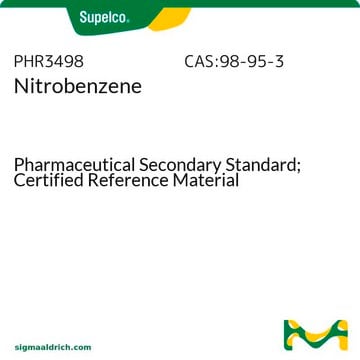About This Item
50 mmHg ( 120 °C)
Recommended Products
vapor density
4.2 (vs air)
Quality Level
vapor pressure
0.15 mmHg ( 20 °C)
50 mmHg ( 120 °C)
product line
ReagentPlus®
Assay
99%
form
liquid
autoignition temp.
899 °F
expl. lim.
40 %
refractive index
n20/D 1.551 (lit.)
pH
8-8.5 (20 °C, 1 g/L)
bp
210-211 °C (lit.)
mp
5-6 °C (lit.)
density
1.196 g/mL at 25 °C (lit.)
SMILES string
[O-][N+](=O)c1ccccc1
InChI
1S/C6H5NO2/c8-7(9)6-4-2-1-3-5-6/h1-5H
InChI key
LQNUZADURLCDLV-UHFFFAOYSA-N
Looking for similar products? Visit Product Comparison Guide
General description
Application
Legal Information
Not finding the right product?
Try our Product Selector Tool.
Signal Word
Danger
Hazard Statements
Precautionary Statements
Hazard Classifications
Acute Tox. 3 Dermal - Acute Tox. 3 Inhalation - Acute Tox. 3 Oral - Aquatic Chronic 3 - Carc. 2 - Repr. 1B - STOT RE 1 Inhalation
Target Organs
Blood
Storage Class Code
6.1A - Combustible acute toxic Cat. 1 and 2 / very toxic hazardous materials
WGK
WGK 3
Flash Point(F)
190.4 °F - closed cup
Flash Point(C)
88 °C - closed cup
Choose from one of the most recent versions:
Already Own This Product?
Find documentation for the products that you have recently purchased in the Document Library.
Customers Also Viewed
Our team of scientists has experience in all areas of research including Life Science, Material Science, Chemical Synthesis, Chromatography, Analytical and many others.
Contact Technical Service















